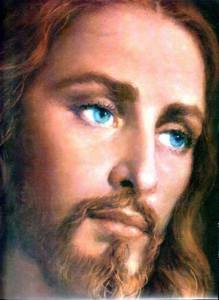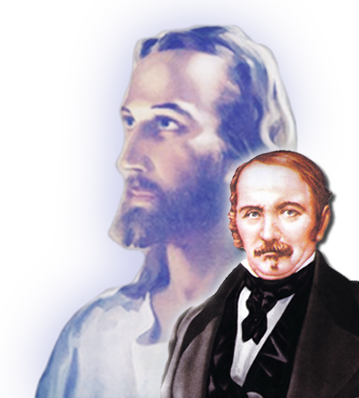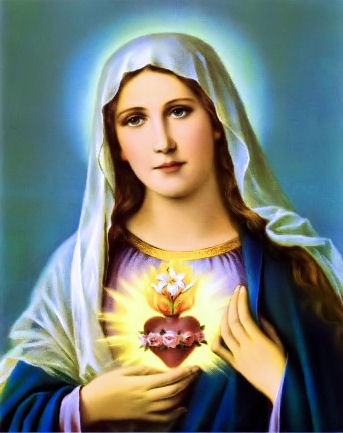TRUTH CORRECT WAY

His Majesty, Our Lord Jesus Christ, Our Gods Love ...
Holy Our Father, Holy be Your Name, came Your Kingdom, done be Your Will … forever, for All Creatures of the Universes …
If we do not make the TOTAL, ABSOLUTE AND CONSTANT FRATERNITY, we never will enter in the Kingdom of Heavens …
What is Spiritism
“Spiritism is a science that deals with the nature, origin and destiny of Spirits, as well as their relationship with the corporeal world.”
“Spiritism realizes what Jesus said of the promised Comforter, by bringing knowledge of those things which allow Man to know where he came from, where he is going and why he is on Earth; so attracting mankind towards the true principles of God’s Law and offering consolation through faith and hope.” — Allan Kardec.
Spiritism and its Codification
Spiritism is the set of laws and principles, as revealed by Superior Spirits, contained in the works of Allan Kardec, which constitute the Spiritist Codification:
- “The Spirits’ Book”,
- “The Mediums’ Book”,
- “The Gospel According to Spiritism”,
- “Heaven and Hell”, and
- “The Genesis”.
Spiritism is at the same time, a science of observation and a philosophical doctrine. As a practical science, it consists of relationships that can be established with the spirits; as philosophy, it includes all the moral consequences resulting from such relationships.
Spiritism reveals more profound concepts with respect to God, the Universe, the Human Being, the Spirits and the Laws which govern life itself. Furthermore, it reveals who we are; where we have come from; where we are going to; what is the objective of our existence; and what are the present and past causes of pain and suffering.
Definition and Philosophy of Spiritism
According to the Gospel According to Spiritism, Spiritism is the new science which has come to reveal to mankind by means of irrefutable proof the existence and nature of the spiritual world and its relation with the physical world. Spiritists, or followers of Spiritism, believe that death is not the end of life and man continues to live as a spirit being who can communicate with those living in this world. After death man retains his character and qualities in the spirit world. This knowledge makes man rearrange his values and priorities in life by becoming less materialistic and tending more toward spirituality.
Spiritists abide by the moral teachings of Jesus Christ as contained in the Gospels. Rather than seeing Jesus as a saviour of humanity from its sins, they see him as an example of moral perfection to be emulated. Spiritism teaches that man is solely responsible for his conduct, be they good or bad.
Basic Teachings
- God is the Supreme Intelligence on the Universe, Creator of all things. God is eternal, immutable, immaterial, unique, omnipotent, supremely just and good.
- Beside the material world inhabited by incarnate Spirits, there is a much bigger and complex one, occupied by the Spirits.
- Within our Universe there are many other inhabited worlds, with beings at different degrees of evolution: some equal, others more or less evolved than human beings.
- The Spirits are the intelligent beings of creation. They constitute the world of the Spirits, which pre-exists and outlives everything.
- Spirits are created simple and ignorant. They evolve intellectually and morally, passing from a lower order to a higher one, until they attain perfection, where they will enjoy unalterable bliss.
- Spirits preserve their individuality before, during, and after each incarnation.
- The Spirits’ relationships with human beings are constant and have always existed. The Good Spirits attract us towards goodness, sustain us in life’s trials, and help us bear them with courage and resignation. The Imperfect Spirits induce us towards error.
- Jesus Christ is the guide and model for all humankind. The Doctrine He taught and exemplified is the most pure expression of God’s Law.
- The morality of Christ, as contained in the Gospels, is the pathway for the secure progress of all human beings. Its practice is the solution for all human problems and the objective to be attained by Humankind.
- Human Beings are given, as a Natural Law, the free will to act, but they must always answer for the consequences of their actions.
- Prayer is an act of adoration for God. It is found in the natural law and is the result of an innate sentiment in every Human Being, just as the idea of the existence of the Creator is innate.
About the Spirits
The spirits are not, as often supposed, beings created apart from us, but the souls of those who have lived on the Earth or on other worlds, stripped of their bodily envelope. He, who admits the existence of the soul surviving the body, admits therefore, the existence of spirits; to deny them would be to also deny the existence of the soul.
Often, people have a very wrong idea about the state of spirits; they are not, as some believe, vague and indefinite beings, nor flames, like the swamp lights, or ghosts like those in tales of souls from another world. They are beings like us, having a body like ours, however, fluid and invisible in its normal state.
When the soul is united to the body during life, it has a double-envelope: one heavy, coarse and destructible which is the body, the other fluid, lightweight, and indestructible, called perispirit.
So there are three essential things in men:
- The soul or spirit, a principle where resides intelligent thought, will and moral sense.
- The body is the material envelope that connects the spirit with the outside world.
- The perispirit is the fluidic envelope, light and weightless, which serves as the bond between the mind and the body.
When the material mantle becomes used and cannot work any longer, he dies and his spirit takes off like the fruit is stripped of their seed, the tree of its bark, the snake from its skin, in one word, as one leaves old clothes that no longer fits, is what is called death.
Death is nothing but the destruction of the material mantle; the soul leaves that body just as the butterfly leaves its chrysalis, but preserves its fluidic body or perispirit.
The death of the body liberates the spirit from that mantle that bound it to earth and made it suffer; once free of that burden, it is left with only its ethereal body, allowing it to travel through space and bridge distances with the speed of thought.
The union of soul, the perispirit and material body is the constitution of man; the perispirit and soul, once separated from the body, become the being called spirit.
Distinctions from Spiritualism
Perhaps two of the leading spiritual groups in the world today that propagate the teaching about the continuity of life after death – and offer proof by communicating with the dead – are Spiritism and Spiritualism. Although there are many similarities between the two, they differ in some fundamental aspects, particularly regarding man’s quest toward spiritual perfection and the manner by which the followers of each practice their beliefs.
Although Spiritism also teaches the immortality of the soul and communication of the living with the dead, it differs from Spiritualism in its philosophy and practices.
Spiritism also teaches reincarnation or rebirth into human life after death. This basically distinguishes Spiritism from Spiritualism. According to the Spiritist doctrine, reincarnation explains the moral and intellectual differences among men. It also provides the path to man’s moral and intellectual perfection by amending for his mistakes and increasing his knowledge in successive lives. For this reason Spiritism does not accept rebirth in animals as this would be retrogressive.
Allan Kardec – by Anna Blackwell


ALLAN KARDEC (born Lyon-France-03/10/1804-dead Paris-France-31/3/1869)
Biographic information from the Translators Preface of The Spirits’ Book as translated into English by Anna Blackwell
TRANSLATOR’S PREFACE
In presenting to her countrymen a work which has long since obtained a wide acceptance on the Continent, the translator has thought that a brief notice of its author, and of the circumstances under which it was produced, might not be without interest for English readers.
Leon-Denizarth-Hippolyte Rivail, better known by his nom de plume of Allan Kardec, was born at Lyons, on the 4th of October 1804, of an old family of Bourg-en-Bresse, that had been for many generations honorably distinguished in the magistracy and at the bar. His father, like his grandfather, was a barrister of good standing and high character; his mother, remarkably beautiful, accomplished, elegant, and amiable, was the object, on his part, of a profound and worshipping affection, maintained unchanged throughout the whole of his life.
Educated at the Institution of Pestalozzi, at Yverdun (Canton de Vaud), he acquired at an early age the habit of investigation and the freedom of thought of which his later life was destined to furnish so striking an example. Endowed by nature with a passion for teaching, he devoted himself, from the age of fourteen, to aiding the studies of those of his schoolfellows who were less advanced than himself; while such was his fondness for botany, that he often spent an entire day among the mountains, walking twenty or thirty miles, with a wallet on his back, in search of specimens for his herbarium. Born in a Catholic country, but educated in a Protestant one, he began, while yet a mere boy, to meditate on the means of bringing about a unity of belief among the various Christian sects, a project of religious reform at which he labored in silence for many years, but necessarily without success, the elements of the desired solution not being at that time in his possession.
Having finished his studies at Yverdun, he returned to Lyons in 1824, with the intention of devoting himself to the law; but various acts of religious intolerance to which he unexpectedly found himself subjected led him to renounce the idea of fitting himself for the bar, and to take up his abode in Paris, where he occupied himself for some time in translating Telemachus and other standard French books for youth into German. Having at length determined upon his career, he purchased, in 1828, a large and flourishing educational establishment for boys, and devoted himself to the work of teaching, for which, by his tastes and acquirements, he was peculiarly fitted. In 1830 he hired, at his own expense, a large hall in the Rue de Sèvres, and opened therein courses of gratuitous lectures on Chemistry, Physics, Comparative Anatomy, and Astronomy. These lectures, continued by him through a period of ten years, were highly successful, being attended by an auditory of over five hundred persons of every rank of society, many of whom have since attained to eminence in the scientific world.
Always desirous to render instruction attractive as well as profitable, he invented an ingenious method of computation, and constructed a mnemotechnic table of French history, for assisting students to remember the remarkable events and discoveries of each reign.
Of the numerous educational works published by him may be mentioned, A Plan for the Improvement of Public Instruction, submitted by him in 1828 to the French Legislative Chamber, by which body it was highly extolled, though not acted upon; A Course of Practical and Theoretic Arithmetic, on the Pestalozzian System, for the use of Teachers and Mothers (1829); A Classical Grammar of the French Tongue (1831); A Manual for the use of Candidates for Examination in the Public Schools; with Explanatory Solutions of various Problems of Arithmetic and Geometry (1848); Normal Dictations for the Examinations of the Hotel de Ville and the Sorbonne, with Special Dictations on Orthographic Difficulties (1849). These works, highly esteemed at the time of their publication, are still in use in many French schools; and their author was bringing out new editions of some of them at the time of his death.
He was a member of several learned societies; among others, of the Royal Society of Arras, which, in 1831, awarded to him the Prize of Honor for a remarkable essay on the question, “What is the System of Study most in Harmony with the Needs of the Epoch?” He was for several years Secretary to the Phrenological Society of Paris, and took an active part in the labors of the Society of Magnetism, giving much time to the practical investigation of somnambulism, trance, clairvoyance, and the various other phenomena connected with the mesmeric action. This brief outline of his labors will suffice to show his mental activity, the variety of his knowledge, the eminently practical turn of his mind, and his constant endeavor to be useful to his fellow men.
When, about 1850, the phenomenon of “table-turning” was exciting the attention of Europe and ushering in the other phenomena since known as “spiritist”, he quickly divined the real nature of those phenomena, as evidence of the existence of an order of relationships hitherto suspected rather than known, namely, those which unite the visible and invisible worlds. Foreseeing the vast importance, to science and to religion, of such an extension of the field of human observation, he entered at once upon a careful investigation of the new phenomena. A friend of his had two daughters who had become what are now called “mediums.” They were gay, lively, amiable girls, fond of society, dancing, and amusement, and habitually received, when “sitting” by themselves or with their young companions, “communications” in harmony with their worldly and somewhat frivolous disposition. But, to the surprise of all concerned, it was found that, whenever he was present, the messages transmitted through these young ladies were of a very grave and serious character; and on his inquiring of the invisible intelligences as to the cause of this change, he was told that “spirits of a much higher order than those who habitually communicated through the two young mediums came expressly for him, and would continue to do so, in order to enable him to fulfill an important religious mission.”
Much astonished at so unlooked-for an announcement, he at once proceeded to test its truthfulness by drawing up a series of progressive questions in relation to the various problems of human life and the universe in which we find ourselves, and submitted them to his unseen interlocutors, receiving their answers to the same through the instrumentality of the two young mediums, who willingly consented to devote a couple of evenings every week to this purpose, and who thus obtained, through table-rapping and planchette-writing, the replies which have become the basis of the spiritist theory, and which they were as little capable of appreciating as of inventing.
When these conversations had been going on for nearly two years, he one day remarked to his wife, in reference to the unfolding of these views, which she had followed with intelligent sympathy: “It is a most curious thing! My conversations with the invisible intelligences have completely revolutionized my ideas and convictions. The instructions thus transmitted constitute an entirely new theory of human life, duty, and destiny, that appears to me to be perfectly rational and coherent, admirably lucid and consoling, and intensely interesting. I have a great mind to publish these conversations in a book; for it seems to me that what interests me so deeply might very likely prove interesting to others.” His wife warmly approving the idea, he next submitted it to his unseen interlocutors, who replied in the usual way, that it was they who had suggested it to his mind, that their communications had been made to him, not for himself alone, but for the express purpose of being given to the world as he proposed to do, and that the time had now come for putting this plan into execution. “To the book in which you will embody our instructions,” continued the communicating intelligences, “you will give, as being our work rather than yours, the title of Le Livre des Esprits (The Spirits’ Book); and you will publish it, not under your own name, but under the pseudonym of Allan Kardec. Keep your own name of Rivail for your own books already published; but take and keep the name we have now given you for the book you are about to publish by our order, and, in general, for all the work that you will have to do in the fulfillment of the mission which, as we have already told you, has been confided to you by Providence, and which will gradually open before you as you proceed in it under our guidance.”
The book thus produced and published sold with great rapidity, making converts not in France only, but all over the Continent, and rendering the name of Allan Kardec a household word” with the readers who knew him only in connection with it; so that he was thenceforth called only by that name, excepting by his old personal friends, with whom both he and his wife always retained their family name. Soon after its publication, he founded The Parisian Society of Psychologic Studies, of which he was President until his death, and which met every Friday evening at his house, for the purpose of obtaining from spirits, through writing mediums, instructions in elucidation of truth and duty. He also founded and edited until he died a monthly magazine, entitled La Revue Spirite, Journal of Psychologic Studies, devoted to the advocacy of the views set forth in The Spirit’s Book.
Similar associations were speedily formed all over the world. Many of these published periodicals of more or less importance in support of the new doctrine; and all of them transmitted to the Parisian Society the most remarkable of the spirit-communications received by them. An enormous mass of spirit-teaching, unique both in quantity and in the variety of the sources from which it was obtained, thus found its way into the hands of Allan Kardec by whom it was studied, collated, coordinated, with unwearied zeal and devotion, during a period of fifteen years. From the materials thus furnished to him from every quarter of the globe he enlarged and completed The Spirits’ Book, under the direction of the spirits by whom it was originally dictated; the “Revised Edition” of which work, brought out by him in 1857 (See Preface to the Revised Edition) has become the recognized textbook of the school of Spiritualist Philosophy so intimately associated with his name. From the same materials he subsequently compiled four other works, namely, The Mediums’ Book (a practical treatise on Medianimity and Evocations), 1861; The Gospel as Explained by Spirits (an exposition of morality from the spiritist point of view), 1864; Heaven and Hell (a vindication of the justice of the divine government of the human race), 1865; and Genesis (showing the concordance of the spiritist theory with the discoveries of modern science and with the general tenor of the Mosaic record as explained by spirits), 1867. He also published two short treatises, entitled What is Spiritism? and Spiritism Reduced to its Simplest Expression.
It is to be remarked, in connection with the works just enumerated, that Allan Kardec was not a “medium,” and was consequently obliged to avail himself of the medianimity of others in obtaining the spirit-communications from which they were evolved. The theory of life and duty, so immediately connected with his name and labors that it is often erroneously supposed to have been the product of his single mind or of the spirits in immediate connection with him, is therefore far less the expression of a personal or individual opinion than are any other of the spiritualistic theories hitherto propounded; for the basis of religious philosophy laid down in his works was not, in any way, the production of his own intelligence, but was as new to him as to any of his readers, having been progressively educed by him from the concurrent statements of a legion of spirits, through many thousands of mediums, unknown to each other, belonging to different countries, and to every variety of social position.
In person, Allan Kardec was somewhat under middle height. Strongly built, with a large, round, massive head, well-marked features, and clear grey eyes, he looked more like a German than a Frenchman. Energetic and persevering, but of a temperament that was calm, cautious, and unimaginative almost to coldness, incredulous by nature and by education, a close, logical reasoner, and eminently practical in thought and deed, he was equally free from mysticism and from enthusiasm. Devoid of ambition, indifferent to luxury and display, the modest income he had acquired from teaching and from the sale of his educational works sufficed for the simple style of living he had adopted, and allowed him to devote the whole of the profits arising from the sale of his spiritist books and from the Revue Spirite to the propagation of the movement initiated by him. His excellent wife relieved him of all domestic and worldly cares, and thus enabled him to consecrate himself entirely to the work to which he believed himself to have been called, and which he prosecuted with unswerving devotion, to the exclusion of all extraneous occupations, interests, and companionships, from the time when he first entered upon it until he died. He made no visits beyond a small circle of intimate friends, and very rarely absented himself from Paris, passing his winters in the heart of the town, in the rooms where he published his Revue, and his summers at the Villa Ségur, a little semi-rural retreat which he had built and planted, as the home of his old age and that of his wife, in the suburban region behind the Champ de Mars, now crossed in every direction by broad avenues and being rapidly built over, but which at that time was a sort of waste land that might still pass for “the country.”
Grave, slow of speech, unassuming in manner, yet not without a certain quiet dignity resulting from the earnestness and single-mindedness which were the distinguishing traits of his character, neither courting nor avoiding discussion, but never volunteering any remark upon the subject to which he had devoted his life, he received with affability the innumerable visitors from every part of the world who came to converse with him in regard to the views of which he was the recognized exponent, answering questions and objections, explaining difficulties, and giving information to all serious inquirers, with whom he talked with freedom and animation, his face occasionally lighting up with a genial and pleasant smile, though such was his habitual sobriety of demeanor that he was never known to laugh.
Among the thousands by whom he was thus visited were many of high rank in the social, literary, artistic, and scientific worlds. The Emperor Napoleon III., the fact of whose interest in spiritist-phenomena was no mystery, sent for him several times, and held long conversations with him at the Tuileries upon the doctrines of The Spirits’ Book.
Having suffered for many years from heart-disease, Allan Kardec drew up, in 1869, the plan of a new spiritist organization, that should carry on the work of propagandism after his death. In order to assure its existence, by giving to it a legal and commercial status, he determined to make it a regularly constituted joint-stock limited liability publishing and bookselling company, to be constituted for a period of ninety-nine years, with power to buy and sell, to issue stock, to receive donations and bequests, etc. To this society, which was to be called “The Joint Stock Company for the Continuation of the Works of Allan Kardec,” he intended to bequeath the copyright of his spiritist writings and of the Revue Spirite.
But Allan Kardec was not destined to witness the realization of the project in which he took so deep an interest, and which has since been carried out with entire exactitude by his widow.
On the 31st of March 1869, having just finished drawing up the constitution and rules of the society that was to take the place from which he foresaw that he would soon be removed, he was seated in his usual chair at his study-table, in his rooms in the Rue Sainte Anne, in the act of tying up a bundle of papers, when his busy life was suddenly brought to an end by the rupture of the aneurysm from which he had so long suffered. His passage from the earth to the spirit-world, with which he had so closely identified himself, was instantaneous, painless, without a sigh or a tremor; a most peaceful falling asleep and reawaking, a fit ending of such a life.
His remains were interred in the cemetery of Montmartre, in presence of a great concourse of friends, many hundreds of whom assemble there every year, on the anniversary of his decease, when a few commemorative words are spoken, and fresh flowers and wreaths, as is usual in Continental graveyards, are laid upon his tomb.
It is impossible to ascertain with any exactness the number of those who have adopted the views set forth by Allan Kardec; estimated by themselves at many millions, they are incontestably very numerous. The periodicals devoted to the advocacy of these views in various countries already number over forty, and new ones are constantly appearing. The death of Allan Kardec has not slackened the acceptance of the views set forth by him, and which are believed by those who hold them to be the basis, but the basis only, of the new development of religious truth predicted by Christ; the beginning of the promised revelation of “many things” that have been “kept hidden since the foundation of the world,” and for the knowledge of which the human race was “not ready” at the time of that prediction.



please, see many other pages in http://www.gsgospel2.wordpress.com

Our Divine Messiah. His Majesty, Our Lord Jesus Christ.
Let your commentary about our pages
Gospel Books,2002.

Gospel Books, 2002
The Holy Heart of Our Mother Mary


Holy Heart of Our Mother Mary
FRATERNITY IS FELICITY TO ALL PEOPLE
Felicity is FRATERNITY to All People.
THE LAW OF OUR LORD GOD, ONLY TWO WAYS, OR FRATERNITY OR DEATH
(Death=Very long lifes in Purgatory or Hells)
HOLY BIBLE IS A SPIRITIST BOOK (FULL OF PARANORMAL FACTS)
OUR LORD JESUS PRACTICES SPIRITISM IN TRANSFIGURATION, LUKE CHAPTER 9
OUR LORD JESUS TEACHES SPIRITISM IN RICH AND LAZARUS PARABLE, LUKE CHAPTER 16
THE MOST IMPORTANT QUESTION OF SPIRITS BOOK OF ALLAN KARDEC
IS QUESTION 121 (121) WHY DOES NOT ALL PERSONS PRACTICE ONLY GOOD ACTIONS?
121. How is it that some spirits have followed the road of good, and others the road of evil ? (THE SPIRITS BOOK of Allan Kardec-1857)
“Have they not their free-will? Our Lord God has not created any spirits bad; He has created them simple and ignorant, that is to say, possessing an equal aptitude for good and for evil. Those who become bad become so of their own free-will.”
GOOD SAMARITAN UNIVERSE SHALOM
Our email: gsgospel1@hotmail.com
These pages are experimentals, educationals, in construction pages.